Custom Driveway Gates
& Ranch Entry Gates
Forging legacies for America’s finest estates since 2011.
1. Traditional & Ranch Style Gates:
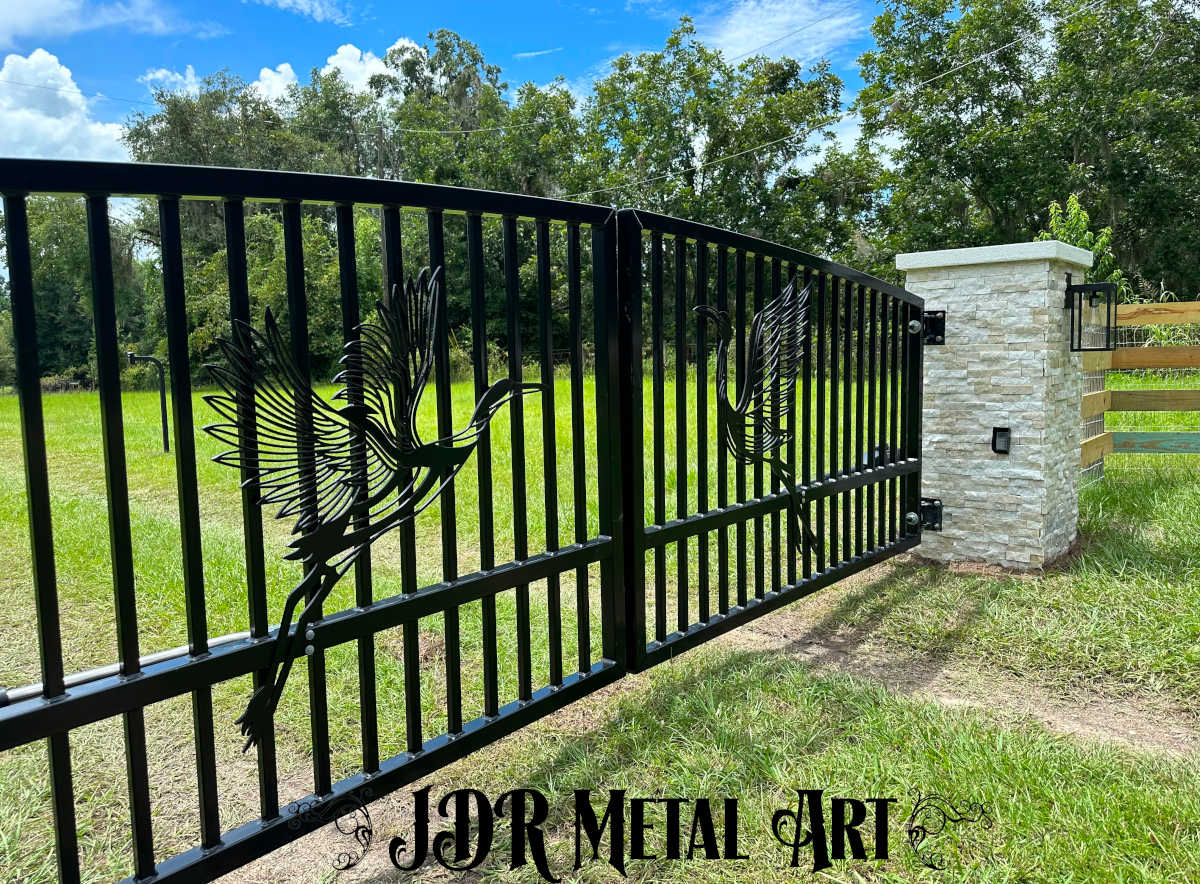
Ranch gates with more simple wrought iron, traditional & ranch style driveway gate designs. These entry gates are typically designed primarily for a more bold yet reserved security statement that says “Keep Out”. Often times they need to serve the dual purpose of keeping livestock or pets from escaping the property. We frequently make our ranch gate designs with this specifically in mind. They don’t have to be flashy, but can incorporate wrought iron elements such as the entry gate design below.
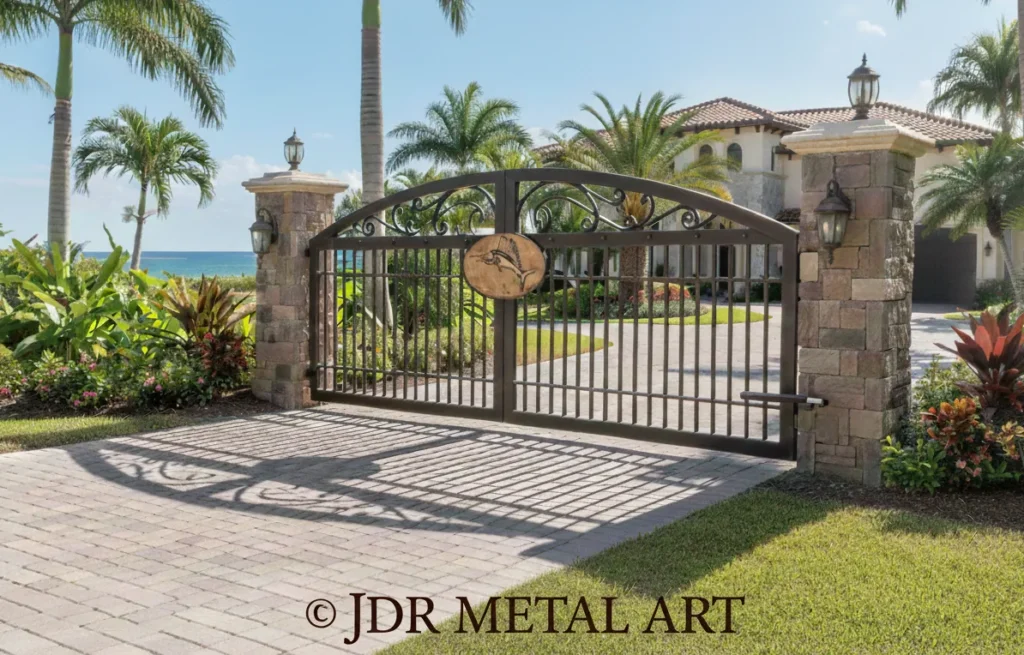
A dual-swing aluminum estate gate featuring a custom sailfish medallion. Powder-coated to withstand coastal weather and salt spray.
Picket styles are also a popular option for traditional or ranch driveway gates, offering both security and a classic aesthetic that complements various architectural designs. They can also incorporate plasma cut designs when required, whether it’s a ranch brand, cutting horse design, or something more ornate and decorative.
2. Wildlife Gate Designs:
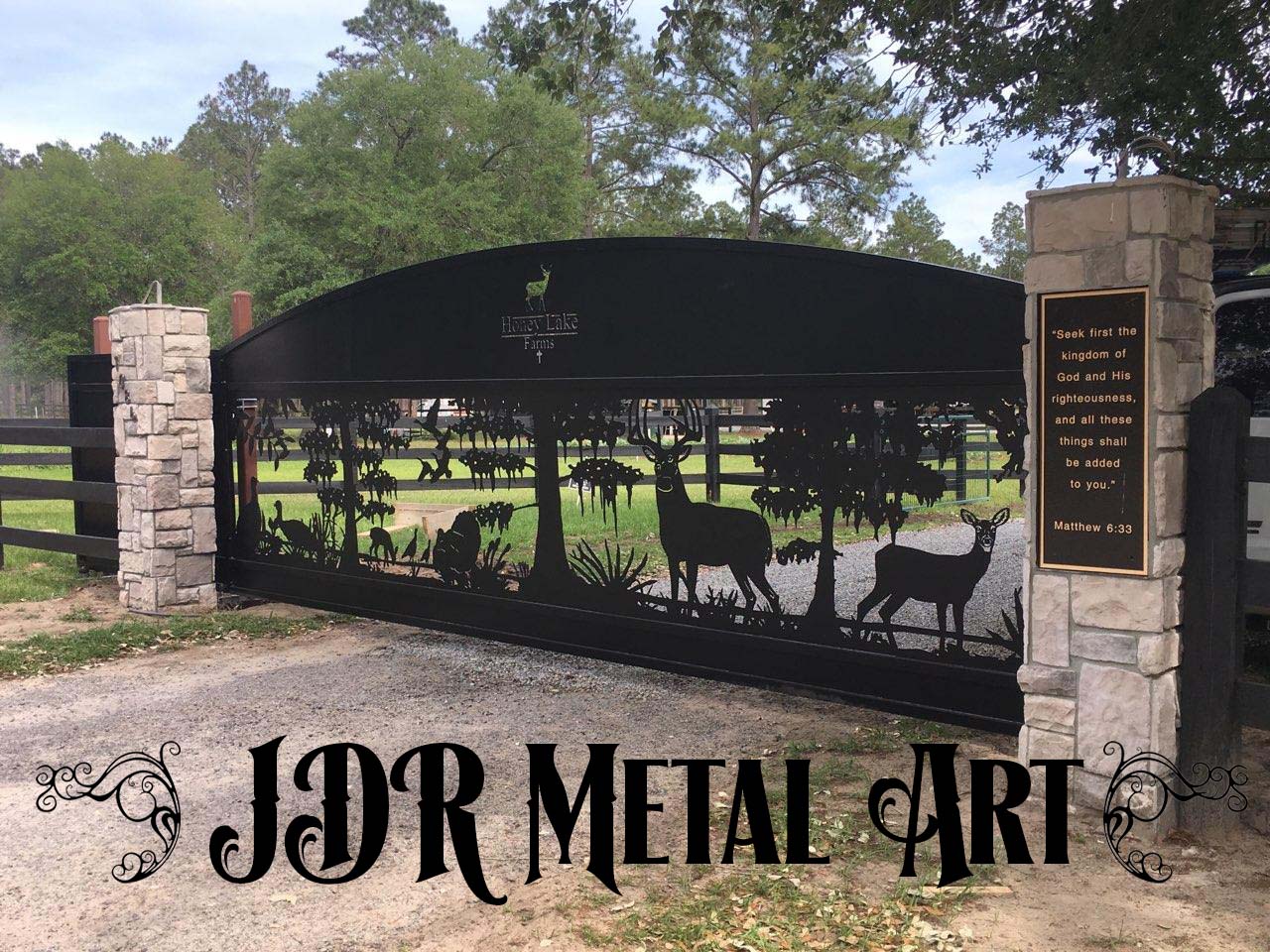
We also make wildlife metal art themed driveway gates. Here’s a 27′ aluminum slide gate with deer, turkeys, ducks and cypress trees for a Tallahassee, Florida retreat. We make driveway gates in and around Florida cities such as Palm Beach, Boca Raton, Pensacola, Jacksonville, Vero Beach, Miami, Naples, Tampa Bay, Orlando, Sarasota, etc., too.
We can make anything you need – imagine palm tree gate design that incorporates your favorite local wildlife. To ensure a perfect fit and optimal aesthetic appeal, providing accurate dimensions is essential for your custom gate project. These wildlife gates create a unique entryway to your property, combining personalized design with enhanced curb appeal.Secure the entrance to your estate with rust-proof aluminum driveway gates, heavy duty framing and plasma cut designs for an extraordinary experience every time you come home.
3. Horse & Equine Gate Designs That Secure Your Farm Driveway Entrance:

Horse and equine gate designs are crafted not only for durability and security but also to complement the overall aesthetic of your farm or ranch, ensuring a cohesive and attractive property appearance. From classic wooden gates to modern metal options, these designs can be tailored to suit your specific needs and style preferences.
What Custom Gate Designs Would Capture the Spirit of Your Horse Ranch?
JDR Metal Art makes equine themed driveway gates for residences, small farms and large horse facilities nationwide. Here’s one of our long-time favorites; a plasma cut German Shepherd & horse themed driveway gate design for Military Mutts Ranch in California:
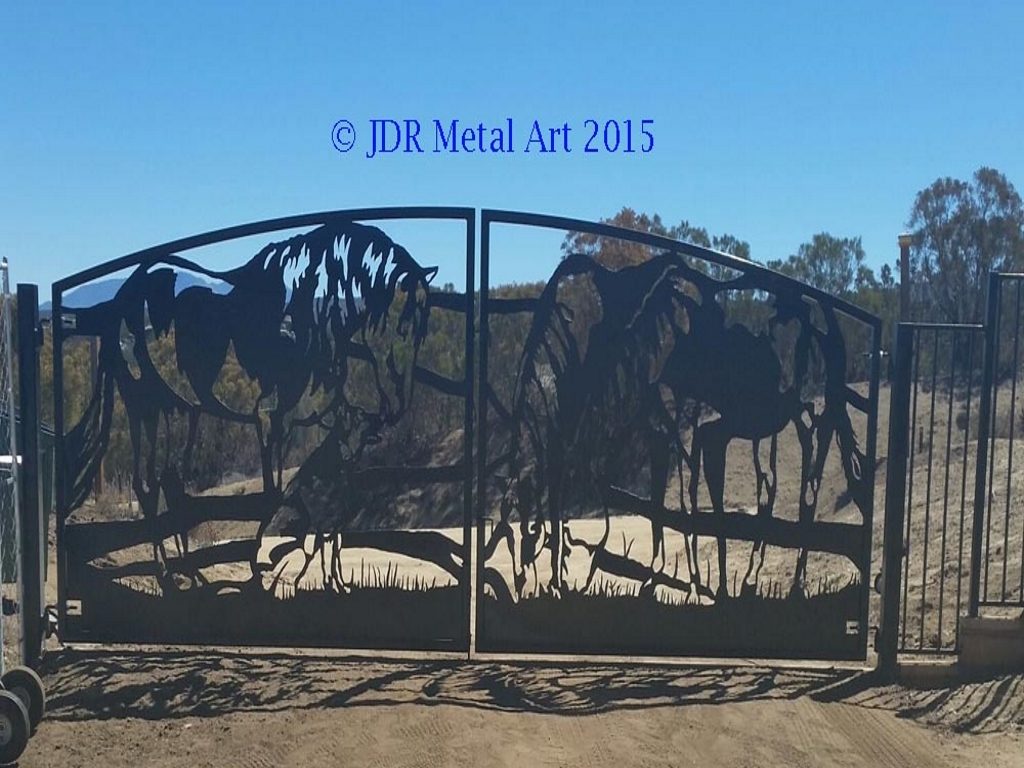
We can blend whatever is uniquely yours into a gate that is, well, uniquely yours. Each gate can be fully customized to match the unique requirements and preferences of your horse ranch. We love working with all different breeds and types of animals!
4. Tree Gate Designs:

We offer a wide variety of tree gate designs, including classic, modern, and custom options to suit any landscape. Each tree gate is built with exceptional construction quality and expert craftsmanship, ensuring durability and a beautiful finish.
Custom Ranch & Farm Gates
Custom Gate Solutions: From Tree Gate Designs to Full Entrances
JDR Metal Art makes a wide assortment of tree themed driveway gates, typically for private residences and estates. Oak trees, maple trees, willow trees, trees of life, etc. Need a driveway overhead arch? We do those, too, such as for this one for a 12′ entry gate located in Ball Ground, a small town on the outskirts of Atlanta, Georgia.
We offer a wide range of entry gates crafted from materials such as wrought iron, steel, and aluminum. Expert welding is essential in our fabrication process, ensuring each gate is strong, durable, and finished with precision craftsmanship. Our gates are designed to provide both security and aesthetic appeal, making them a perfect addition to any property.
Custom Aluminum Driveway Gates or Custom Steel Driveway Gates? Which is Right for Me?
Nearly all of our gate designs can be built from either steel or aluminum. What’s the distinction? We’ve got a short primer on the difference between steel vs. aluminum driveway gates.
Steel Custom Driveway Gates
We most commonly create steel driveway gates because they are so strong and durable. Much like its precursor iron, steel is more susceptible to corrosion than aluminum when exposed to moisture and oxygen.
Aluminum Custom Driveway Gates
When the situation calls for it, we also build custom aluminum driveway gates. Aluminum gates are a good choice for those who need a lighter gate or heightened corrosion resistance. Aluminum is less than half the weight of steel and has a very high strength to weight ratio. Although aluminum doesn’t actually “rust” it will still corrode in the form of “white rust” when not properly coated.
Custom Wrought Iron Driveway Gates
We also build custom wrought iron driveway gates. These are typically very heavy gates that require a large gate opener, thus adding expense to the project. They are typical driveway gate installations for businesses and typically urban residences needing heightened security.
Why Settle for Ordinary When Your Entrance Begs For Extraordinary?
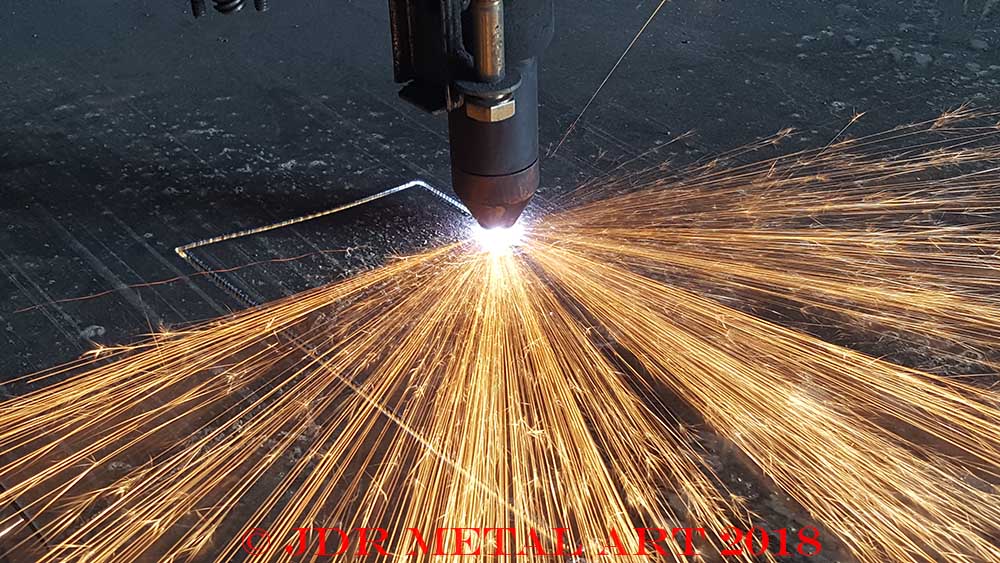 Precision in progress: Our in-house CNC plasma table cutting a custom design. Every gate is cut, welded, and finished in our Ohio facility—never outsourced.[/caption]
Precision in progress: Our in-house CNC plasma table cutting a custom design. Every gate is cut, welded, and finished in our Ohio facility—never outsourced.[/caption]
Imagine pulling up to your property: Does your current entrance truly reflect what’s special about your property? Or does it feel generic, lacking the personal touch that says “THIS is ours”… Clients often tell us their existing gates are falling well short—rusting quickly, minimal privacy, clashing with their home’s architecture, falling apart, hasn’t worked in years, etc. So…what if your gate not only stepped up your curb appeal but also acted like a 24/7 security guard at your entrance providing unbreakable security, deterring intruders while welcoming guests with elegant, masterfully crafted wildlife, horse, or tree designs? Don’t need something plasma cut? We also do more traditional ranch style gate designs that are more focused on delivering privacy and security than curb appeal.
What’s held you back from upgrading to a custom metal gate that perfectly matches your style and needs?
Standard options often disappoint with poor durability or limited customization. At JDR Metal Art, we solve that by plasma-cutting intricate designs from premium, extra-thick steel or aluminum, depending what the situation calls for, ensuring your gate stands strong against time. Plasma cutting a steel custom driveway gate panel for a client near Ocala Florida from 1/8″ material with a Hypertherm plasma cutter.
What are Plasma Cut Driveway Gates?
We plasma cut a practically limitless variety of designs using our plasma torch.According to Wikipedia:
Plasma cutting is a process that cuts through electrically conductive materials by means of an accelerated jet of hot plasma (Electric arc). Typical materials cut with a plasma torch include steel, stainless steel, aluminum, brass and copper, although other conductive metals may be cut as well.
JDR Metal Art’s Solution: Custom Driveway Gates That Meet Your Property’s NeedsBefore choosing us you were probably searching for high-end custom driveway gates that combine artistry with top-tier security. Something has prevented you from finding the perfect fit—is it limited local options or long-term concerns about warranty? At JDR Metal Art, we craft ornate gates (without the rust issues) using plasma-cutting and powder coat technologies for precise, lifetime-lasting peace of mind. Our gates are proudly made in the USA, reflecting American craftsmanship and quality. With a no-holds barred warranty to back it. Picture a custom estate gate featuring your favorite theme—deer silhouettes for an inland wildlife lover, or palm trees for a beachfront property. Maybe a brand new personalized gate for your out of state/summer property up in the mountains of Appalachia, or a specialty tree-themed AirBNB? We do custom entry gate projects all the time for homeowners, builders, gate contractors, and ranchers and farmers. Besides unmatched durability and aesthetic appeal, what are you really looking for in a luxury entrance gate? Security that locks out threats while boosting privacy? A custom driveway gates design that integrates seamlessly with your landscape? We deliver all that, plus:
- Materials: Heavy-duty steel or marine-grade aluminum.
- Customization: From 10′ to 36′ wide, with swing, slide, or automated options.
- Themes: Wildlife, ranch, tree, horse, or fully custom—from scratch or our gallery of 200+ designs.
- Security Features: Heavy duty frames, optional integration with gate openers for hands-free access.
- Emotional Impact: Gates that make you feel secure and proud, turning your driveway into a statement of who you are.
For Florida locals in Palm Beach County (including West Palm Beach, Jupiter, and Wellington), Orlando, Tallahassee we offer consultations and installation assistance. Nationwide clients enjoy white-glove shipping—your gate arrives ready to install, with guides for easy setup.
How We Help You Achieve Your Dream Entrance
Our process is simple and client-focused:
- Consultation: Share your vision—what style, size, and features excite you?
- Design: We sketch and refine until it’s perfect, incorporating your ideas.
- Fabrication: Hand-built from aluminum or steel in our shop for precision and quality.
- Powder Coating: Sandblasted & primed first. Thousands of Topcoat Colors available – Standard = 60% Gloss Black
- Delivery/Install: Delivered or shipped anywhere in the U.S. We work with installers nationwide.
- Satisfaction: Backed by our lifetime guarantee—durable, beautiful, and secure.
What would it mean for you to have a gate that not only secures your property but also fulfills that long-held dream of a personalized entrance? Many clients report how they love feeling more at ease, with enhanced property values and compliments from neighbors. One client in Las Vegas, Nevada says her oak tree gate still makes her smile every time she comes home 10 years later.
Ready to Transform Your Driveway? Start today.
Don’t let another season pass with a gate that doesn’t measure up. Contact us today for a free quote on your custom luxury custom driveway gate. Serving clients in Palm Beach County, Tallahassee, Vero Beach, Naples, Tampa Bay, and beyond—with seamless nationwide shipping.
Searching for Automatic Driveway Gate Installers Near Me?
If you’re searching for custom driveway gate installers near me here’s what to know before hiring, or make sure to read this planning guide before purchasing if you are thinking about installing it yourself.
Which is the best finish for custom driveway gates? Paint vs. Powder Coat
Liquid Paint
Liquid paint is the traditional coating for decorative gates. There is typically a prime coat with rust inhibitors applied first followed by a top coat of enamel. Rustoleum is probably the most widely used paint finish.
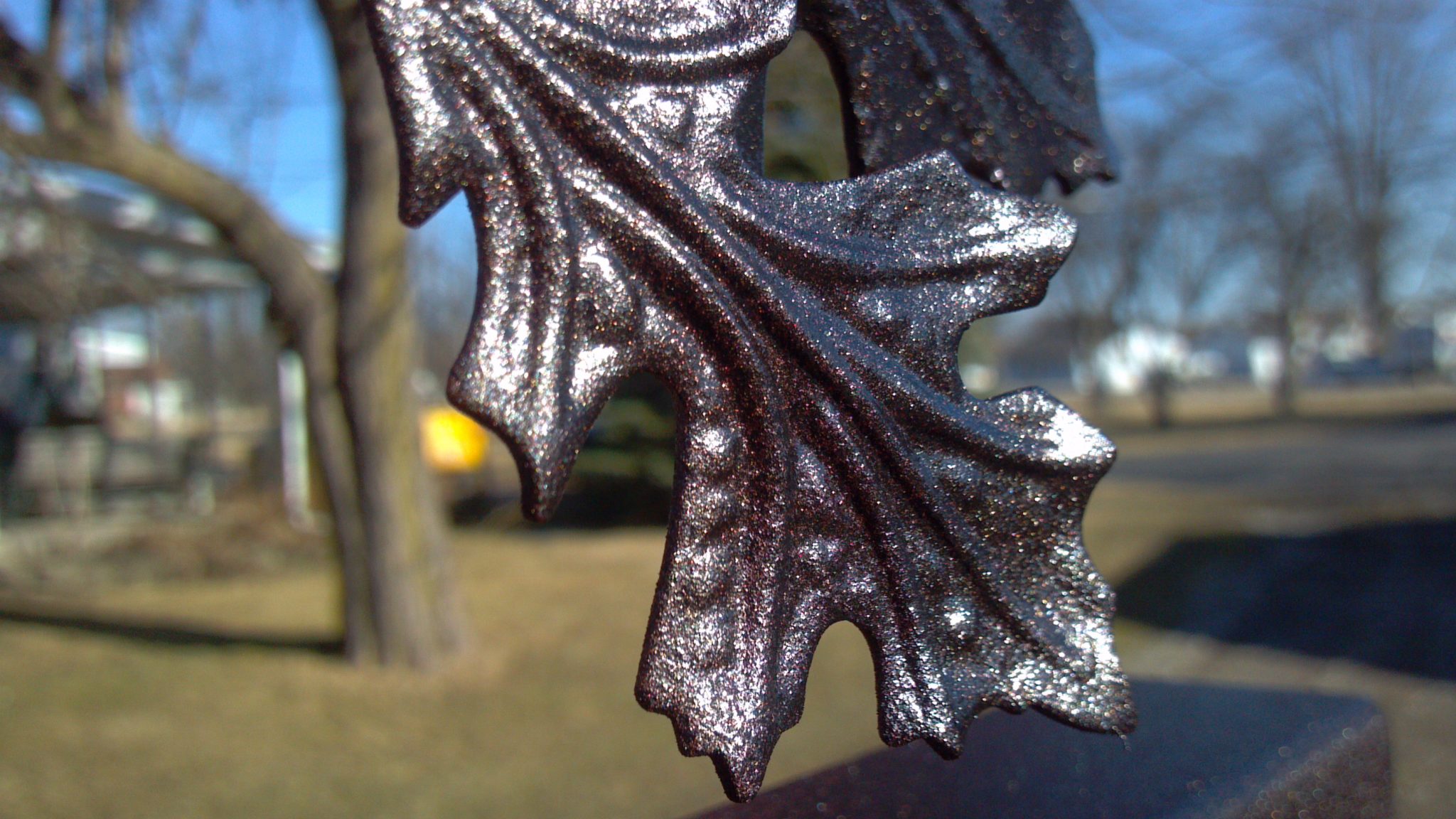
The benefit of a paint finish is that it’s (typically) relatively cheap and doesn’t require much investment in equipment to apply: just an air compressor and a spray gun. Perhaps even just a paint brush or roller.
A scratched paint finish can be easily touched up with a paint brush.
The downsides of paints are that they have a long cure time, typically one week to one month or more until they achieve anything near the full potential properties.
Paints are difficult to evenly apply a protective exterior paint coating to highly decorative or dimensional elements; extreme attention must be taken to ensure such pieces are sprayed from all directions with several passes to ensure full coverage. All of course without getting any runs in the paint!
Paints require toxic solvents to be thinned and sprayed. As these solvents evaporate there are tiny pores left in the finish that allow moisture to penetrate the paints. If the metal is not fully cleaned and prepared properly the metal will rust underneath the paint causing it to flake off.
Liquid paints, with the exception of epoxies, do not build thickly. Liquid paints leave a thin coating compared to powder coat, often only than 20% as thick.
The VOC’s in paint are hazardous and therefore not environmentally friendly and it is a messy process to deal with them.
Compared to powder coat, paint is typically much more easily damaged.
Powder Coat
Powder coat is a form of dry paint. Technically it is paint resin in powder form.
The benefits of powder coating on ornamental driveway gates are easy and even application with electrostatic charging of the powder. Gates with many small, intricate details can be easily powder coated with relatively little effort with powder coating. The powder is given an electrostatic charge as it is carried from a fluidized hopper to the spray gun. The charged powder exits the gun seeking the part which is grounded. The charged powder then sticks to the decorative part as shown below.

Powder coating uses air rather than a solvent such as paint thinner or water to fluidize into a state where it can be applied. There are no toxic solvents or paint fumes involved with powder coating.
Powder coat cures with heat, not by evaporation of any solvents. Once the powder is applied the decorative part is then sent into an oven where it is baked at a set time and temperature – typically 10 minutes at 400 degrees part temperature. As soon as the part cools down the powder is fully cured into its full potential toughness.
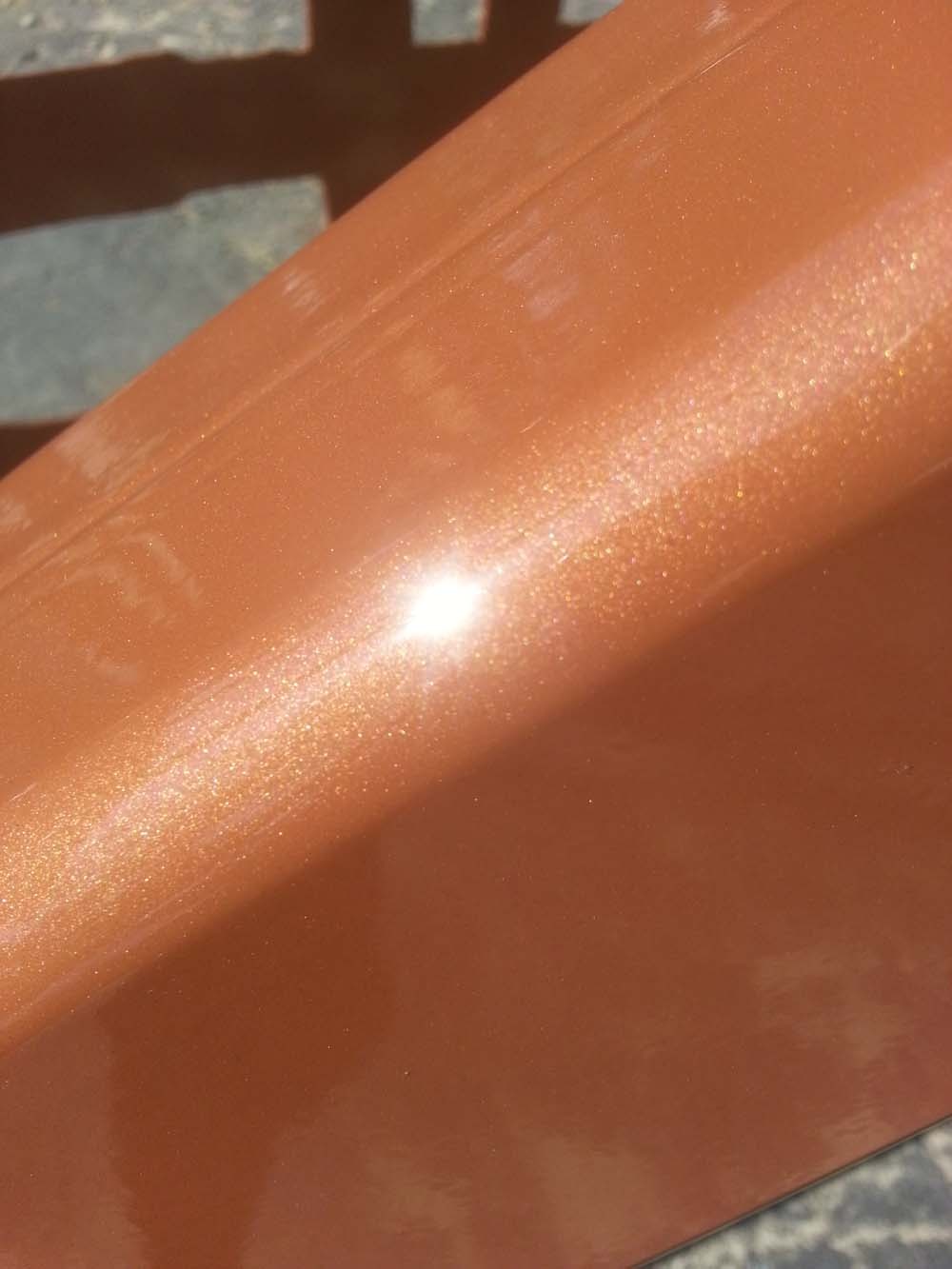
A much thicker film can be built with powder coat when compared to paint. This means a thicker layer of protection against the elements.
Our In-House Powder Coat Capabilities:
Any Gates – Steel or Aluminum
Any Size up to 10′ tall x 24′ long
Powder Coating Our Own Gates since 2014
Proud Member of Chemical Coaters Association International
We Make Our Own Driveway Gate Hinges:
We designed and make our own maintenance-free sealed bearing driveway gate hinges with a 2000lb load rating (per gate leaf). No greasing is required to keep our driveway gates swinging freely. They are easily adjustable for the gate installer.
Frequently Asked Questions
Everything you need to know about designing, building, and installing your custom gate.
Sizing & Design
What size driveway gate do I need? We recommend the gate be at least 1-2 feet wider than your actual driveway to allow room for hinges and clearance.
-
Minimum Recommendation: 12′ wide (avoids “close calls” with delivery drivers).
-
Emergency Access: Some local jurisdictions require a 14′ opening for emergency vehicles.
-
Measuring Tip: Measure from about a foot past the hard surface on one side to a foot past the other side.
Should I get a Single Swing or Dual Swing gate?
-
Single Swing: Best for driveways up to 12′ wide. It requires only one opener and one post, making it more cost-effective.
-
Dual Swing: Required for driveways wider than 16′. If you have a curved driveway, a dual swing might be necessary depending on where the hinge post sits.
Can you build wide gates? Yes. We build standard sizes (10′, 12′, 14′, 16′, 18′, 20′, 24′) and custom sizes down to the inch.
-
Swing Gates: Up to 16-18′ wide for a single leaf (limited by opener strength).
-
Slide Gates: We have built single slide gates as wide as 37′ and can go up to 40′+.
Swinging vs. Sliding: Which is better?
-
Swinging Gates: Easier to install, cheaper to automate, and require less maintenance.
-
Sliding Gates: Great if you have limited space for a gate to swing open, but they are more expensive to automate and require a “tail” (counterbalance) for support.
Materials & Quality
Which is better: Steel or Aluminum? It depends on your environment:
-
Aluminum: Weighs 60% less than steel and is extremely corrosion resistant. It is the best choice for coastal areas or large gates where weight is a concern. Our aluminum gates use a minimum 3/16″ material thickness.
-
Steel: Very strong and durable but heavier (approx. 250lbs for a 10′ panel). It requires careful maintenance to prevent rust. Our steel gates use a minimum 1/8″ thickness.
-
Our Standard: All our metal is stamped “Made in USA.”
How heavy are the gates?
-
Steel: Approx. 25 lbs per linear foot.
-
Aluminum: Approx. 8.3 lbs per linear foot.
-
Example: A 10′ steel panel weighs ~250lbs, while the same design in aluminum weighs just ~83lbs.
What about the posts? We don’t use thin fence posts. Our standard mounting posts are heavy-duty 4×4″ square tubing with a minimum 1/4″ wall thickness. We also fabricate 6×6, 8×8, and larger custom posts.
Installation & Openers
Can I install the gate myself? Yes. With proper planning, many of our clients install their own gates.
-
No Welding Needed: Our system bolts directly to the post.
-
The Process: Set the gate on wood blocks for clearance, bolt the hinges to the post, and set the post in concrete.
Do I need a permit?
-
Rural Areas: Typically, no permit is needed.
-
City/HOA: You may need a permit or approval. Always check with your local building department or HOA board before ordering.
How do I power my automatic gate?
-
AC Power: Run a standard 110-volt (20 amp) line to the gate location. This charges the opener batteries.
-
Solar Power: If you can’t run power, solar is a great option. You need at least 4 hours of direct sunlight per day. We recommend solar-ready openers like the LiftMaster LA 412 or LA 500.
Do gate openers work when the power goes out? Yes. Most modern openers run on a battery backup system (12v or 24v). A fully charged battery can typically cycle the gate ~300 times without power. We recommend replacing these batteries every 3-4 years.
Pricing & Process
How much does a custom driveway gate cost? Price depends heavily on design intricacy and material.
-
Range: generally $400 – $1,000 per linear foot.
-
Example: A 10′ custom panel typically falls between $4,000 and $10,000.
What is the payment schedule? We require a 50% down payment to begin fabrication (ordering materials, cutting the art). The remaining balance is due upon completion before shipping.
How long does it take to build? Our typical lead time is 6 to 10 weeks from the date of the deposit. Large or highly complex projects may take longer.
Do you charge for design work?
-
Existing Designs: No charge. Choose from our 100+ templates.
-
New Custom Art: For completely new concepts, we may require a design deposit (up to $1,500) depending on complexity.
Custom Driveway Gates in Action:
Photos can show you the design, but they can’t show you the engineering. Watch the video below to experience the smooth, heavy-duty operation of a JDR Metal Art custom driveway gate. This project features a large custom metal art oak tree with a wildlife theme, fully integrated with an LA500 automatic gate opener for seamless entry and exit, time after time.
The Hidden Costs of a Subpar Driveway Gate
What happens if you stick with an outdated or insecure entrance gate? Beyond the frustration of frequent repairs, you might be unknowingly risking your family’s safety—exposed to an improperly built gate, unauthorized access or even theft. In especially upscale areas like Palm Beach Gardens, Boca Raton, or Naples, a weak entrance diminishes property values and peace of mind. Your home’s entrance is setting the tone for your sanctuary. If it doesn’t evoke pride or security, whats that mean for your daily life? Clients often share how a dysfunctional gate, or lack of any gate at all, leaves them feeling vulnerable, especially those who often travel out of town frequently, leaving family behind without that extra layer of security. Are you willing to settle for that, or is it time to invest in a personalized gate that protects what matters most?

